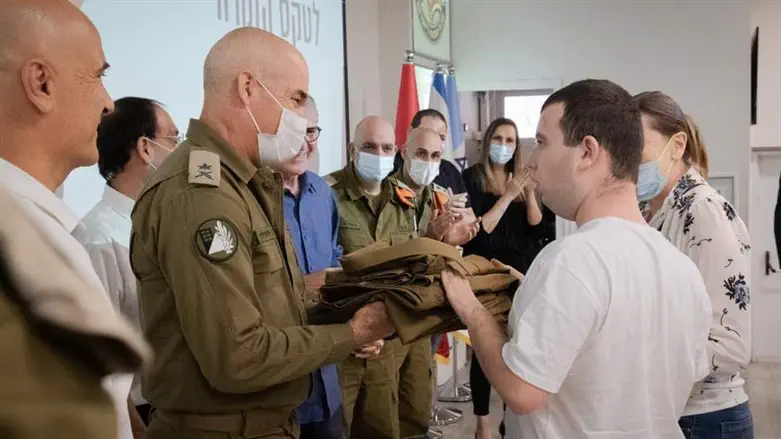
In a heartwarming ceremony that took place at Home Front Command in the Ramle military base, 10 young men and women with disabilities were inducted into the Israel Defense Forces. Among these new recruits is Ittai Shiffman, 19, of Rehovot, a young man on the autistic spectrum who graduated Lotem Special Education School in Rehovot last year.
Ittai’s elder brother Roi is something of a legend in the IDF. Five years ago, he joined the army, despite being wheelchair-bound. Born premature and lacking oxygen, Roi suffers from cerebral palsy that sorely limits his physical functioning and mobility. Yet despite his physical disabilities, his parents insisted on giving him a normative childhood, mainstreaming him into a regular classroom and supporting him throughout the years of living with disability. At the end of twelve years of studies, their son graduated with honors and completed his matriculation exams successfully.
The trouble started when Roi’s friends all received their call-up notices and prepared for their imminent induction, while Roi sat at home, waiting. He was lonely, disillusioned and depressed, but when Roi’s mom learned about Special in Uniform (SIU) and determined that her son was the perfect candidate, his life changed. She battled a long and difficult road that ultimately ended with Roi in uniform, serving as manager of the medical clinic in the IDF bases.
Special in Uniform is a groundbreaking program of the IDF in collaboration with Jewish National Fund-USA that integrates youth with mild physical and mental disabilities and autism into the Israel Defense Forces and helps prepare them for a career following army service. The program, offering adolescents with special needs training and skills that empower them to integrate long-term into Israeli society and the workforce, accentuates the unique talents of each participant and places him or her into an appropriate setting within the IDF.
Special in Uniform’s volunteer training program culminates with graduating youths receiving their soldier’s IDs and being placed in military bases across Israel, where they cull from the knowledge and skills that they acquired to perform important jobs on base, forget their disabilities, and focus instead on their versatile abilities and talents. Since its inception in 2001, 1,870 Israeli youths with physical and mental disabilities have participated in the program, and of these, 400 continued to the next stage and were inducted into the IDF.
As an adolescent watching his big brother Roi advancing and achieving personal satisfaction in the army, Ittai resolved that, one day, he’d do the same. And now, following a long and grueling process, Ittai has finally realized his dream and is proudly wearing his spanking new uniform.
Ittai’s mom Tammy Isaac-Shiffman relates, choked with emotion: “Suddenly the doors of the reception room opened, and there was Ittai, walking confidently and naturally on stage… Ittai and the kids in his class had started volunteering in the military once a week, doing their part like every else. A small drop in the ocean of ‘normal’ all around them… A small drop for humanity, but an ocean of success for us. And today, he’s in uniform, just like every else.”
“This is the greatest day in my life, the achievement of a lifetime as a mother of children with disabilities. I really hope our family’s journey will inspire another families of children with disabilities and show them that, yes! they can do it!”
Roi, who was also in the audience watching his younger brother and cheering him on, shares a little about his experience serving in the IDF.
“I work at the reception desk, receiving people who come to the infirmary. I came here four-and-a-half year ago, and the infirmary did so much for me socially. My best friends in the world are the guys I met here. Back when I was a teen, I didn’t dream that I’d ever make it to the army. I wanted it so badly, but it was completely out of reach. I have complicated medical issues, and I didn’t think the army would accept me.”
“But you know what? They took me, and they don’t pity me either — which is what I really want. When people meet someone with special needs, they tend to either pity them or just feel dumb because they don’t know how to act with them. Then there are the people who just treat them like everyone else.
“Here in the army, I was never treated like a wimp. People didn’t think I was pitiable or incapable. They always treated me exactly the way I wanted to be treated — like everyone else. They don’t let me smooth edges or cut corners. I’m expected to produce, to achieve, to show discipline, just like a regular soldier. They treat me like an equal, a friend, which is the way that everyone deserves to be treated.”
Ittai is hoping to follow in his brother’s footsteps and serve in Home Front Command, preparing emergency storerooms for national emergencies or war.


